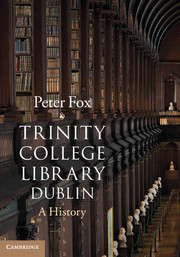Book contents
- Frontmatter
- Dedication
- Contents
- List of illustrations
- List of tables
- Acknowledgements
- Abbreviations
- Introduction
- 1 Early days: 1592–1640
- 2 Ussher, Kells and Durrow: 1641–1665
- 3 Alexander, Bath and the Jacobites: 1666–1708
- 4 A new building: 1709–1737
- 5 Stearne, Gilbert and Lyon: 1738–1749
- 6 The Library in 1750
- 7 Leland to Barrett: 1751–1800
- 8 Fagel: 1798–1809
- 9 Barrett: 1801–1821
- 10 Sadleir, Wall and Todd: 1822–1851
- 11 The Library in 1850
- 12 Todd as Librarian: 1852–1869
- 13 Malet and Ingram: 1869–1886
- 14 Abbott: 1887–1913
- 15 Smyly: 1914–1948
- 16 The Library in 1950
- 17 Parke: 1949–1965
- 18 Professional management: 1965–1983
- 19 Epilogue: 1984–2003
- Appendix 1 Librarians, Assistant Librarians and Deputy Librarians1
- Appendix 2 Growth of the collection
- Appendix 3 The Library oath and declaration
- Sources and select bibliography
- Index of Trinity College Dublin manuscripts
- General index
- Plate Section
- References
18 - Professional management: 1965–1983
Published online by Cambridge University Press: 05 June 2014
- Frontmatter
- Dedication
- Contents
- List of illustrations
- List of tables
- Acknowledgements
- Abbreviations
- Introduction
- 1 Early days: 1592–1640
- 2 Ussher, Kells and Durrow: 1641–1665
- 3 Alexander, Bath and the Jacobites: 1666–1708
- 4 A new building: 1709–1737
- 5 Stearne, Gilbert and Lyon: 1738–1749
- 6 The Library in 1750
- 7 Leland to Barrett: 1751–1800
- 8 Fagel: 1798–1809
- 9 Barrett: 1801–1821
- 10 Sadleir, Wall and Todd: 1822–1851
- 11 The Library in 1850
- 12 Todd as Librarian: 1852–1869
- 13 Malet and Ingram: 1869–1886
- 14 Abbott: 1887–1913
- 15 Smyly: 1914–1948
- 16 The Library in 1950
- 17 Parke: 1949–1965
- 18 Professional management: 1965–1983
- 19 Epilogue: 1984–2003
- Appendix 1 Librarians, Assistant Librarians and Deputy Librarians1
- Appendix 2 Growth of the collection
- Appendix 3 The Library oath and declaration
- Sources and select bibliography
- Index of Trinity College Dublin manuscripts
- General index
- Plate Section
- References
Summary
John Hurst
The reforms that had been initiated by Parke continued under his successors. John Hurst was appointed as Librarian from 12 July 1965, but the Board, which had previously shown generosity in placing him on the professorial salary scale as the Deputy Librarian, remarkably saw no need to increase his salary or change his conditions when he became the Librarian. William Dieneman replaced him as the Deputy Librarian in April 1966. For the first time in its history the College not only had a professionally qualified Librarian but also one whose appointment was full-time and not held in conjunction with teaching or other offices. However, the Board found itself unable to relinquish academic control completely. It created for Parke a new honorary office of Curator of the Library, which had no clear terms of reference except to chair the Library Committee. Parke remained as Curator throughout the tenure of Hurst and his successor, Denis Roberts, and relinquished the title only in 1972, shortly before his retirement from the Vice-Provostship and Chair of Ancient History. Hurst's tenure as Librarian was brief and uncomfortable.
As the completion date for the New Library approached, it became ever clearer that the building would be inadequate to meet the demands about to be placed upon it. Whilst he was the Deputy Librarian, Hurst had been closely involved with the planning and was aware of the new building's shortcomings. He sought to reduce their impact, but he received little support from the academic community in the College. The divergence of views between the Librarian and some of the Fellows came to a head at a contentious Board meeting in November 1966 when the Board refused to overturn its earlier decision to use part of the basement of the New Library as an exhibition hall, despite Hurst's pleading that he needed the space to transfer books from their various stores around the College.
- Type
- Chapter
- Information
- Trinity College Library DublinA History, pp. 319 - 340Publisher: Cambridge University PressPrint publication year: 2014



